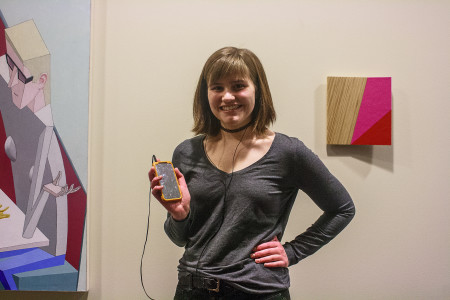
Emma Roszkowski
roszkows@grinnell.edu
It is common practice for Chicago artists such as Chance The Rapper, Donnie Trumpet and Saba to feature other local musicians on their tracks. However, one collaborator — spoken word poet turned rapper Noname — has especially captivated listeners, appearing just long enough to drop a tantalizing verse and disappear. Noname’s produced work is sparse, but Grinnellians will have the opportunity to hear her perform in Gardner Lounge tonight, Friday, April 29, at 9 p.m. Opening the show will be fellow Chicagoan and activist Ric Wilson. The concert will be in conjunction with the BreakBeat Poets’ reading at Eco House earlier in the day.
Noname, born Fatima Warner, grew up listening to local Chicago blues greats like Buddy Guy and Howlin’ Wolf and watching “Def Poetry Jam.” Inspired by the emotional impact that the “Def Poetry” performers had, Noname began writing her own poetry. In high school she joined YOUmedia, a youth media program that mentors Chicago students interested in art, music and spoken word, where she performed spoken word poetry and connected with aspiring young artists such as Chancelor Bennett, now known as Chance The Rapper.
Noting the similarity of spoken word to freestyling, Noname began to dip her toes into rap, appearing on the track “Lost” on Chance the Rapper’s “Acid Rap” (2013). She has since been featured on the project “Surf” (2015) by Donnie Trumpet & The Social Experiment and the tracks of artists such as Saba, SPZKRT and Mick Jenkins.
Despite her plethora of features credits, Noname has not yet released her own comprehensive collection of work. She has been trumpeting the release of an eternally forthcoming EP, “Telephone,” since 2014. Singles of hers have been found floating around YouTube, posted by channels that have no tangible relation to the rapper. These solitary gems explain the fervor of Noname fans — Noname delivers critiques of institutional racism, poverty and politics as well as odes to Mary Jane that leave the listener happy and warm, despite the songs’ serious subject matters.
Self-described musician and prison abolitionist Ric Wilson’s work complements that of Noname thematically while differing stylistically. Wilson delivers similarly socially conscious messages but with more dance influences. Don’t be fooled by his lighthearted delivery, though, Wilson takes his activism seriously. In 2014, he served as a delegate for the grassroots organization We Charge Genocide, which appeared before the United Nations to charge the Chicago Police Department with genocide and torture of black and brown youth in Chicago.
Noname and Ric Wilson promise to deliver music that appeals to music lovers and activists alike.

















































